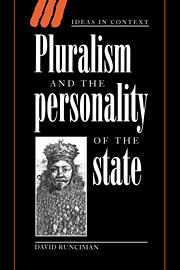Book contents
- Frontmatter
- Contents
- Preface
- PART I THE PERSONALITY OF ASSOCIATIONS
- PART II POLITICAL PLURALISM
- 5 Maitland and the real personality of associations
- 6 Figgis and the communitas communitatum
- 7 Barker and the discredited state
- 8 Cole and guild socialism
- 9 Laski and political pluralism
- 10 The return of the state
- PART III THE PERSONALITY OF THE STATE
- Bibliography
- Index
- Ideas in Context
7 - Barker and the discredited state
Published online by Cambridge University Press: 10 November 2009
- Frontmatter
- Contents
- Preface
- PART I THE PERSONALITY OF ASSOCIATIONS
- PART II POLITICAL PLURALISM
- 5 Maitland and the real personality of associations
- 6 Figgis and the communitas communitatum
- 7 Barker and the discredited state
- 8 Cole and guild socialism
- 9 Laski and political pluralism
- 10 The return of the state
- PART III THE PERSONALITY OF THE STATE
- Bibliography
- Index
- Ideas in Context
Summary
By the time Figgis published Churches in the modern State in 1913, it formed part of an identifiable movement in English political thought. This was the movement that Ernest Barker was to identify a year later as ‘the new federalism’, and both Maitland and Figgis were seen by Barker as exponents of this distinct new creed. Of Figgis Barker wrote that he made an ‘ally in the religious sphere’ for those who were campaigning elsewhere for greater group freedoms, whether on behalf of trade unions, local authorities, or nations within nation-states; and of the work of Figgis and these others Barker himself more or less approved. Indeed, Barker's Political thought in England, though giving space to the full range of recent developments in English ideas, makes it quite apparent where the author's own preferences lay. In a choice between, for instance, Herbert Spencer's scientific individualism and Bernard Bosanquet's metaphysical statism, Barker's sympathies are clearly with the latter. Yet as between Bosanquet's stark, and T. H. Green's more emollient view of the place of the state in national life, Barker's chose to side with the less strident of the two. He was, in essence, a mild idealist, philosophically conservative, politically liberal. As such, he found much in the new federalism he could admire – the emphasis on the group as opposed to the individual (‘if we are individualists now’, Barker wrote, ‘we are corporate individualists’), the insistence upon freedom of association, the distrust of centralised power and bureaucracy.
- Type
- Chapter
- Information
- Pluralism and the Personality of the State , pp. 150 - 161Publisher: Cambridge University PressPrint publication year: 1997

